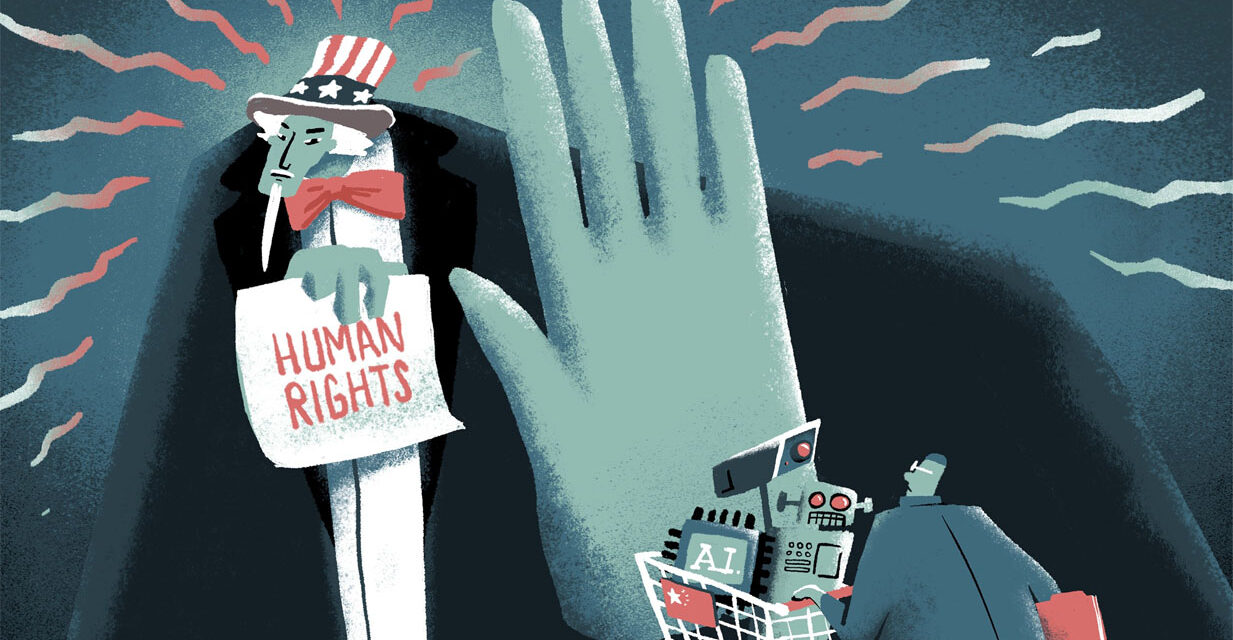
UN: AI is Violating Human Rights

Artificial Intelligence (AI) is being exploited as spyware, posing a grave threat to freedom and human rights under the pretext of counterterrorism, warns Fionnuala Ní Aoláin, a United Nations human rights expert. Ní Aoláin, appointed as the “Special Rapporteur on the promotion and protection of human rights and fundamental freedoms while countering terrorism” in 2017, recently presented a report to the United Nations Human Rights Council, shedding light on the violation of human rights and freedoms through certain forms of AI.
While acknowledging the transformative potential of new technologies, Ní Aoláin emphasizes the risks associated with technological advancements specifically used, developed, and applied to counter terrorism and threats. She identifies consistent patterns among states and countries that employ AI surveillance in counterterrorism efforts. Firstly, they claim to use AI for security measures only in exceptional circumstances. Secondly, there is little to no protection of human rights throughout the process. Lastly, nearly every government that justifies AI surveillance by citing “exceptional circumstances” eventually extends its usage into everyday life, eroding various rights and freedoms.
In her report, Ní Aoláin emphasizes the international concern surrounding sophisticated surveillance technology initially developed for counterterrorism and national security purposes. These tools have been revealed to be used for spying on individuals such as politicians, journalists, human rights activists, lawyers, and ordinary citizens who have no connection to terrorism or pose no national security threat. The abuse of AI is embedded in the counterterrorism and countering violent extremism arena, fueled by the absence of a universally agreed-upon international definition of these phenomena. States define these terms to advance their own interests, often disregarding human rights and the rule of law.
AI’s impact on human rights is evident in various examples. Violations include privacy breaches through data exploitation, constraints on freedom of speech, and the use of drones to surveil protests and gatherings, impeding the right to peaceful assembly.
In France, President Macron’s recent call to block social media as a means to curb the spread of riots has drawn criticism as an encroachment on free speech rights.
To safeguard human rights, Ní Aoláin calls for a moratorium on the use and advancement of AI until adequate restrictions and boundaries are established.
However, setting boundaries for AI regulation poses considerable challenges, as noted by Kevin Baragona, founder of the program DeepAI, who describes AI as one of the most complex issues to regulate. The integration of AI technology across social, economic, political, and military domains, including law enforcement, national security, criminal justice, and border management systems, further complicates the task of defining regulations.
Despite the current applications of AI, Ní Aoláin firmly asserts that the continued use of AI without appropriate government concern and boundaries will inevitably lead to the neglect of human rights.
In line with Ní Aoláin’s concerns, UN human rights chief Michelle Bachelet also calls for urgent action to address the risks AI poses to human rights. She urges states to implement moratoriums on the sale and use of AI systems until adequate safeguards are in place. Bachelet emphasizes that the higher the risk to human rights, the more stringent the legal requirements for the use of AI technology should be. She further advocates for banning AI applications that cannot comply with international human rights law, recognizing that while AI can be a force for good, its use without sufficient regard for human rights can have negative, even catastrophic, effects.
Bachelet’s concerns are underscored by the widespread use of spyware, exemplified by the Pegasus revelations. This surveillance tool, commercialized by the NSO group, affected thousands of individuals across 45 countries on four continents, leading to an unprecedented level of surveillance that the UN rights chief deems incompatible with human rights.
The report published by Bachelet’s office, OHCHR, highlights the dire situation regarding the impact of AI on various rights, including privacy, health, education, freedom of movement, freedom of assembly and association, and freedom of expression. Tim Engelhardt, a Human Rights Officer, emphasizes that the situation has worsened over the years and requires immediate action. The report raises concerns about the failure of due diligence in incorporating AI applications, resulting in unjust treatment of individuals. It also underscores how AI systems rely on vast datasets, which can be faulty, discriminatory, or irrelevant, posing risks to human rights. The biased datasets used by AI systems contribute to discriminatory decisions, particularly affecting marginalized groups.
Biometric technologies, such as facial recognition, are increasingly employed by states, international organizations, and technology companies. These technologies demand urgent human rights guidance due to their potential for real-time and long-distance identification, enabling unlimited tracking of individuals. The report reiterates the need for a moratorium on their use in public spaces until concerns regarding accuracy, discriminatory impacts, and compliance with privacy and data protection standards are thoroughly addressed.
Transparency from both companies and states regarding the development and use of AI is identified as a crucial element. The complexity of AI systems, coupled with intentional secrecy, hampers public understanding of the effects on human rights and society. The report emphasizes the need for far-reaching shifts to establish human rights guardrails on the use of AI to prevent the perpetration of human rights violations at an enormous scale with limited visibility.
Urgent action is required to address the risks AI poses to human rights. Setting boundaries, establishing clear regulations, and ensuring transparency are essential to safeguarding human rights in the face of advancing AI technology. Failure to act now could result in severe consequences for individuals worldwide.

























I would like to know what AI thought of this article.
That would tell us of its Bias.
Answer solved!